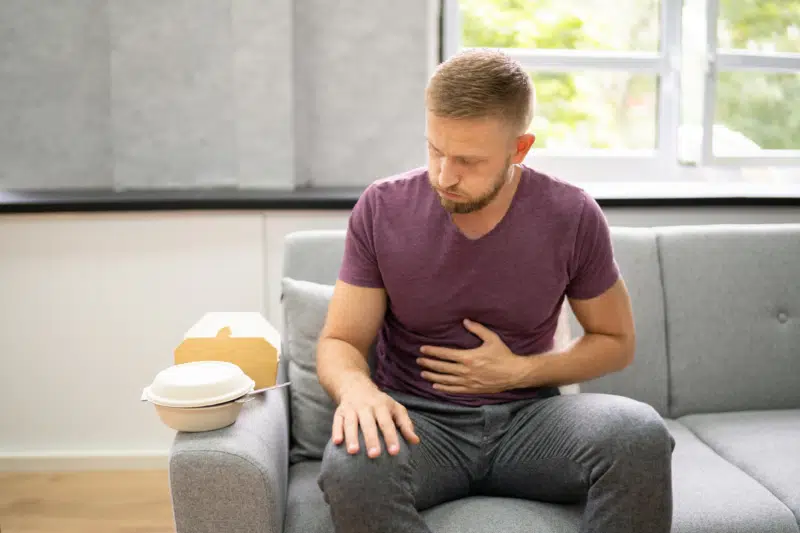
 go back
go back
Gastroesophageal Reflux Disease (GERD)
Gastroesophageal reflux occurs when your stomach acid flows back from the stomach into your esophagus, causing a burning sensation in the chest (“heartburn”) and/or regurgitation of food or liquid that leaves a sour taste in your mouth.
Make An AppointmentUp to 20% of adults in the United States have GERD.
*According to the American College of Gastroenterology
Condition content was medically reviewed by an AllerVie Health physician in Oct. 2022.
What is GERD?
Gastroesophageal reflux occurs when your stomach acid flows back from the stomach into your esophagus, causing a burning sensation in the chest (“heartburn”) and/or regurgitation of food or liquid that leaves a sour taste in your mouth. It is termed Gastroesophageal Reflux Disease (GERD) when that reflux causes troublesome symptoms and/or complications.
GERD is one of the most common gastrointestinal diseases in the United States. For those with allergies and asthma, GERD can aggravate their symptoms or sometimes mimic other allergic diseases.
What Causes GERD?
Reflux occurs when your lower esophageal sphincter is not working properly. This band of muscle is at the end of your esophagus and relaxes and opens when you swallow, and then it tightens again.
If it does not tighten or close properly, stomach acid and contents can rise up, causing the symptoms of acid reflux and GERD.
Examples of some things that can loosen that sphincter include:
- Hiatal hernia
- Eating large meals that can distend the upper part of your stomach
- Lying down too soon after eating
- Certain foods
- Some asthma medications (oral steroids and quick-relief inhalers, such as albuterol, at high doses)
What Foods Trigger GERD?

Foods that trigger GERD can be different for each person, but common triggers include:
- Fatty or greasy foods
- Citrus fruits and juices
- Alcohol
- Spicy foods
- Chocolate
- Peppermint or mint
- Onions
- Coffee
- Tomatoes and tomato sauces
GERD Symptoms
- Regurgitation or backwash of food or sour liquid
- Sore throat or feeling like you have a lump in your throat
- Painful or difficult swallowing
- Recurrent or chronic cough
- Heartburn
- Bad breath
- Cavities or teeth erosion
- Laryngitis or a hoarse voice
- Wheezing
Reflux is common among patients with asthma, with up to 40-80% of patients reporting reflux symptoms.
*According to Chan, W. W. (2021, April 30). Pulmonary Complications of Gastroesophageal Reflux Disease. The Esophagus.
GERD Risk Factors
Overweight or obese individuals
Pregnant Women
Smokers
Asthmatics
Individuals that have a hiatal hernia
Individuals with Scleroderma or connective tissue disorders
Individuals with delayed emptying of the stomach, or gastroparesis

What Allergy and Asthma Conditions Overlap with Gerd?
- Chronic/recurrent cough – Chronic cough is sometimes a result of GERD. When it is, GERD treatment usually resolves the cough.
- Asthma – When asthma symptoms flare, the esophageal sphincter can relax, triggering reflux and GERD symptoms. GERD can also trigger asthma. If both diseases are present, it is important they are both under good control to prevent further worsening.
- Eosinophilic esophagitis (EoE) – While trouble swallowing (or the sensation that food is stuck in the throat) is more common for EoE, regurgitation and heartburn are typical for GERD, the symptoms for these two entities often overlap. However, they are diagnosed and treated very differently.
How Does a Doctor Diagnose a Patient with Gerd?
If you have classic symptoms of GERD, oftentimes you do not need any tests to diagnose your condition. However, if you have symptoms that are unresponsive to usual treatment or if you have signs of complications, you may need diagnostic testing with a gastroenterology specialist.
Tips for Managing and Preventing Gerd

Changes to your lifestyle can help prevent or manage GERD. These include:
- Maintaining a healthy weight
- Eating frequent, smaller meals
- Avoiding fatty and spicy foods and foods that trigger your GERD
- Eating upright and not laying down for two hours after eating
- Wearing loose fitting clothing on the belly area
- Sleeping in an upright position, with the head of the bed elevated 6-8 inches
- Avoid tobacco and alcohol
- Decreasing or avoiding caffeinated beverages
How to Treat Gerd Naturally?
Symptoms from mild GERD may respond to natural remedies such as those listed below:
Weight-loss
Being overweight or obese raises intra abdominal pressure, which can cause stomach acid backflow.
Stress-management
Stress causes GERD symptoms. Stress raises sympathetic tone, which raises heart rate and slows body activities, including digestion.
Chamomile tea
This herbal tea is antispasmodic and anti-inflammatory. Chamomile tea is heart-healthy.
Regularly exercise
Exercise improves digestive health. Movement helps the stomach empty and reduces tension on the lower esophageal sphincter, improving tone and function. However, you should be careful not to exercise too soon after eating, as this can trigger reflux.
Avoid dietary triggers
Spicy foods, alcohol, caffeine, chocolate, citrus liquids, and tomato juice might be triggers. Focus on a diet rich in whole grains and fresh fruits and vegetables. This will help you treat GERD.
What Medications CAN Treat Gerd?
There are over-the-counter and prescription medications to help with GERD symptoms. These include:
- Antacids
- H-2 receptor blockers
- Proton pump inhibitors
If unresponsive to these treatments, you may need to see a gastroenterology specialist to help confirm your diagnosis, get your symptoms under control, and prevent GERD complications.
Gastroesophageal Reflux Disease FAQ
What does GERD feel like?
The most common sign is heartburn. It makes your chest feel like it’s on fire. But GERD can make people feel different things. Some people may feel like there’s a lump in their throat or like their food won’t go down. Some people may feel like they have to burp a lot.
How long does GERD last?
GERD symptoms typically occur at least twice per week, or happen for several weeks/months.
How to sleep with GERD?
The best way to get relief from GERD is to sleep on your left side on a 6-8 inch incline. This puts your lower esophageal sphincter (LES) well above the acid in your stomach, and gravity can move quickly to bring any stomach contents back down to your stomach. There are pillows that are made to help you sleep in an inclined position, or put bricks or wooden blocks under the legs of the head of the bed.
